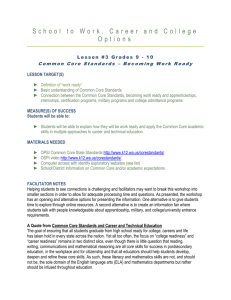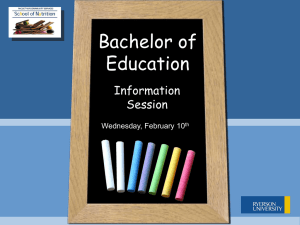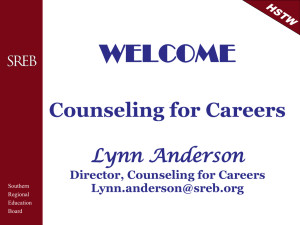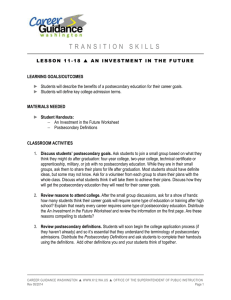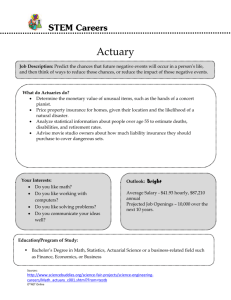What Should My Child Do After High School?
advertisement
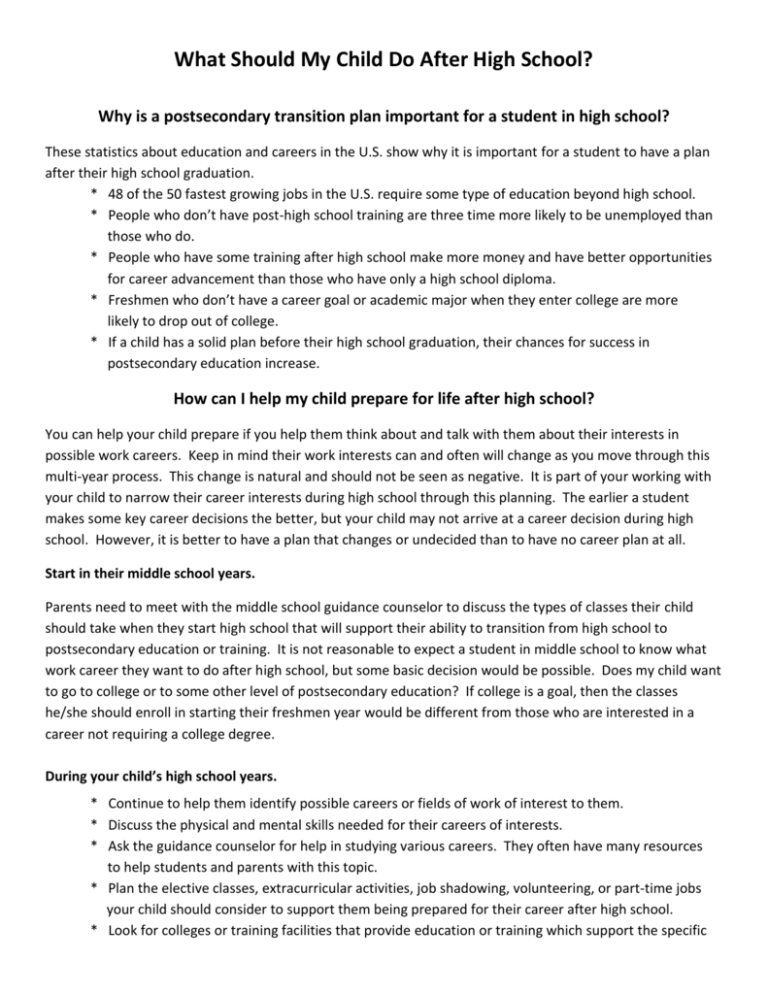
What Should My Child Do After High School? Why is a postsecondary transition plan important for a student in high school? These statistics about education and careers in the U.S. show why it is important for a student to have a plan after their high school graduation. * 48 of the 50 fastest growing jobs in the U.S. require some type of education beyond high school. * People who don’t have post-high school training are three time more likely to be unemployed than those who do. * People who have some training after high school make more money and have better opportunities for career advancement than those who have only a high school diploma. * Freshmen who don’t have a career goal or academic major when they enter college are more likely to drop out of college. * If a child has a solid plan before their high school graduation, their chances for success in postsecondary education increase. How can I help my child prepare for life after high school? You can help your child prepare if you help them think about and talk with them about their interests in possible work careers. Keep in mind their work interests can and often will change as you move through this multi-year process. This change is natural and should not be seen as negative. It is part of your working with your child to narrow their career interests during high school through this planning. The earlier a student makes some key career decisions the better, but your child may not arrive at a career decision during high school. However, it is better to have a plan that changes or undecided than to have no career plan at all. Start in their middle school years. Parents need to meet with the middle school guidance counselor to discuss the types of classes their child should take when they start high school that will support their ability to transition from high school to postsecondary education or training. It is not reasonable to expect a student in middle school to know what work career they want to do after high school, but some basic decision would be possible. Does my child want to go to college or to some other level of postsecondary education? If college is a goal, then the classes he/she should enroll in starting their freshmen year would be different from those who are interested in a career not requiring a college degree. During your child’s high school years. * Continue to help them identify possible careers or fields of work of interest to them. * Discuss the physical and mental skills needed for their careers of interests. * Ask the guidance counselor for help in studying various careers. They often have many resources to help students and parents with this topic. * Plan the elective classes, extracurricular activities, job shadowing, volunteering, or part-time jobs your child should consider to support them being prepared for their career after high school. * Look for colleges or training facilities that provide education or training which support the specific interests of your child . * Encourage your child to take classes that are challenging to them, no matter what their career interests may be. The benefits of education are never useless. What are some of the education or training options for my child after high school? There are many ways to pursue education and training after high school depending on their career goals. With a postsecondary high school plan, you and your child will be better prepared for the time and money required to reach those career goals. Here are some training options. On-the-job-training For some careers, your child will need formal, on-the-job-training in order to be employed. Some career examples involved here are bank teller, flight attendant, or emergency dispatcher. Apprenticeship training In an apprenticeship, your child works with experienced employees and completes classroom training in a program that can last from one to five years and result in an industry qualification. Apprentices are paid, but at a lower rate than fully qualified workers in the field. Some careers that require the use of the apprenticeship method include dental laboratory technician, mechanics, heavy equipment operators, carpenters, welders, cabinetmakers and electricians. Military training The military trains people in over 140 occupations and many of the skills learned in these occupations can be used in civilian jobs. Every recruit signs a legal contract for eight years of duty. Usually, military personnel spend two to six years on active duty and the remaining years in the Reserve forces. Service members receive basic pay, allowances and benefits. They are also eligible for tuition assistance at colleges and universities and other training programs. Certificate programs Many community colleges, technical schools and private career schools offer six-month to one-year programs that lead to certification in a specialized field. Careers that might require a certificate training program include pharmacy technician, dental assistant, paralegal, computer equipment repair, floral design and medical assistant. Associate degree programs Community colleges also offer two-year degree programs that results in an associate’s degree. Careers that require an associate’s degree include office manager, nurse, respiratory therapist, forest technician and interior designer. A person with an associate’s degree can also use those credits to transfer to a four-year college or university, if they want to pursue a bachelor’s degree. Bachelor’s degree programs State and private colleges and universities offer four-year programs that lead to a bachelor’s degree. Your child has a better chance of completing a bachelor’s degree program if he/she has a study plan before they begin this schooling. A bachelor’s degree will prepare your child for many careers such as dietician, forester, graphic designer, social worker, teacher, and technical writer. Education beyond a bachelor’s degree There are many careers in which your child may be interested in, such as architect, layer, teacher and doctor, which require education beyond a bachelor’s degree.

